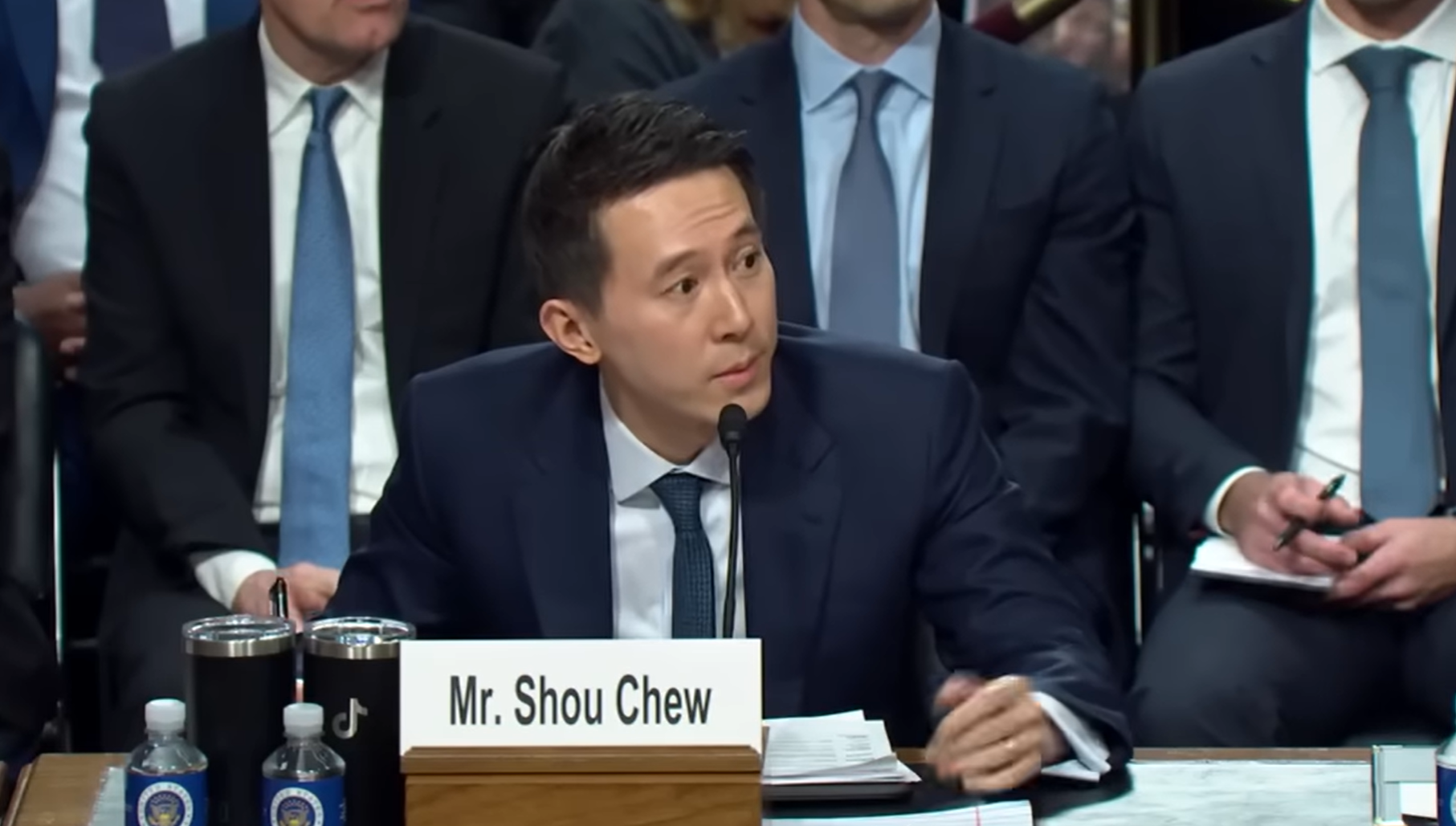By now, we’ve all seen the video of Senator Tom Cotton questioning TikTok CEO Shou Zi Chew during a hearing of the Senate Committee on the Judiciary.
Shou Zi Chew is a Singaporean businessman and entrepreneur who has been serving as the CEO of TikTok since 2021. He lives with his wife, Vivian Kao, and their two children in Singapore.

Chew and Cotton shared an interesting exchange during the hearing on 31 January 2024.
During the hearing, Cotton is seen constantly interrupting Chew and not letting the latter finish speaking.
Here are some points from the session:
- After confirming that Chew has Singaporean citizenship and has never applied for Chinese citizenship before, Cotton asked him if he has ever been a member of the Chinese Communist Party. We’re not sure if Cotton is aware that only Chinese citizens are eligible to join said party.
- Chew previously worked in Xiaomi. In this hearing, Chew was there to talk about TikTok. Cotton asked Chew if it was true that Xiaomi was sanctioned by the United States government in 2021 for being a Chinese Communist Military company. Chew responded by saying that the lawsuit was overturned.
- After Cotton brought up the Tiananmen Square massacre, he asked Chew if the latter thinks “the Chinese government is committing genocide against the weaker people” and if he thinks Xi Jinping is a “dictator”. When Chew said it was not appropriate for him, as a businessman, to comment on world leaders, Cotton asked Shou if he was scared that he’ll lose his job if he said anything negative about the Chinese Community Party.
Netizens were quick to comment on this exchange.
This is absolutely phenomenal in its revelation of how racist our government is, not just because the question itself is Sinophobic, but also because it’s clear that Tom Cotton can’t tell Asians apart even when they tell him. https://t.co/mnYCBg5kai
— Heidi N. Moore (@moorehn) January 31, 2024
One social media user commented that the Senator is “low-key racist” and another said “the lack of intelligence at such positions is astounding.”

While we’ve watched the exchange and read various comments, who exactly is Tom Cotton?
Read on to find out more about this United States Senator.
Cotton Was Raised on a Farm
Tom Cotton (full name: Thomas Bryant Cotton) was born on 13 May 1977, in Yell County, Arkansas, to Len and Avis Cotton. He was raised on a small cattle farm in the Dardanelle area.
His father, Len Cotton, was a district supervisor in the Arkansas Department of Health.
His mother, Avis Cotton, was a schoolteacher. She later became principal of their district’s middle school.
Cotton Had Troubles Speaking During His Younger Years
Cotton barely spoke until he was three. Even then, it was hard for others to understand him due to a speech impediment.
His older sister, Sarah, acted as a “translator” for others to understand him better.
Cotton underwent intensive speech therapy during most of his elementary school years.
Cotton Graduated From Harvard College and Harvard Law School
Standing at 1.96m tall, Cotton played basketball in Dardanelle high school.
After graduating from high school in 1995, Cotton was accepted to Harvard College. There, he majored in government (yes, there’s such a degree) and was a member of the editorial board of The Harvard Crimson, often dissenting from the liberal majority.
He graduated with an A.B. magna cum laude in 1998.
Cotton was then accepted into a master’s programme at Claremont Graduate University. He left in 1999 as he found academic life was “too sedentary.”
He later enrolled in Harvard Law School and graduated with a J.D. degree in 2002.
Post-graduation
After he graduated from Harvard Law School, Cotton spent one year as a law clerk in the U.S. Court of Appeals for the Fifth Circuit, a federal court.
He later became an associate at two different law firms, Gibson, Dunn & Crutcher and Cooper & Kirk, before he enlisted in the U.S. Army.
Cotton Enlisted in the United States Army
In January 2005, he enlisted in the United States Army and entered Officer Candidate School (OCS). He was commissioned as a second lieutenant in June that same year.
He completed the U.S. Army Ranger Course, a 62-day small unit tactics and leadership program, and Airborne School.
He led a 41-man air assault infantry platoon in Iran, and planned and performed daily combat patrols as part of Operation Iraqi Freedom (OIF).
Cotton was promoted to first lieutenant in December 2006, and was deployed to eastern Afghanistan.
He was honourably discharged (think: ORD) in September 2009. During his time in the service, he completed two combat deployments overseas, was awarded a Bronze Star, two Army Commendation Medals, a Combat Infantryman Badge, a Ranger tab, an Afghanistan Campaign Medal, and an Iraq Campaign Medal.

Cotton Became a United States Senator in 2014
Cotton was elected as the U.S. representative for Arkansas’s 4th congressional district in 2012 and to the Senate at age 37 in 2014, defeating two-term Democratic incumbent Mark Pryor.
The Senate is considered the upper chamber of congress. Every state elects two U.S. Senators that make up the 100 members in the Senate. These senators are elected to serve six-year terms and are a part of the Legislative branch of government.
The Senate takes actions on bills, resolutions, amendments, motions, nominations, and treaties by voting. Senators vote in a variety of ways, including roll call votes, voice votes, and unanimous consent.
Cotton is considered politically conservative.
As a United States Senator, Cotton Has Received Multiple Death Threats
In 2018, Adam Albrett of Fairfax County, Virginia, was arrested for “faxing death threats” against President Donald Trump and members of Congress, including Cotton.
In October 2019, local authorities charged James Powell, a 43-year-old Arkansas resident, with “first-degree terroristic threatening” after an investigation by U.S. Capitol Police and the FBI.
In January 2020, 78-year-old Henry Edward Goodloe was sentenced to two years’ probation for sending Cotton a threatening letter and a package containing white powder. The letter read: “You ignored me. Maybe this will get your attention.” The powder was found to be unbleached flour and starch.
During Trump’s Presidency, Cotton Was Loyal to Him
Cotton frequently met with Trump’s staff during the transition period.
In November 2017, White House chief strategist Steve Bannon told The New Yorker this: “Cotton was the one most supportive of us, up front and behind the scenes, from the beginning.”
In a CNN interview shortly after the 2016 presidential election, Cotton denied that waterboarding is a form of torture. He was of the view that if a terrorist had critical information and waterboarding was the only way to obtain it, it was a “tough call”.
“Presidency is a tough job. And if you’re not ready to make those tough calls, you shouldn’t seek the office. Donald Trump’s a pretty tough guy, and he’s ready to make those tough calls,” Cotton said.
During his 2016 presidential campaign, Trump said the United States should resume the use of waterboarding.
Cotton’s Voted Against the COVID-19 Hate Crimes Act
Cotton was one of six Republican Senators to vote against advancing the COVID-19 Hate Crimes Act, which would follow the U.S. Justice Department to review hate crimes related to COVID-19 and establish an online database.
In May 2021, President Joe Biden signed this act into the law, which placed particular emphasis on the increasing violence against Asian Americans.
Cotton voted for the 2023 Omnibus Appropriations Bill.
Cotton was one of the 18 Republican senators to vote for this USD$1.7 trillion bill. This bill earmarked USD$45 billion more for Ukraine to defend itself against Russia, but prohibited funding for more immigration barriers in the U.S.




